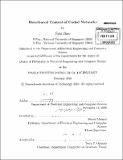Distributed control of coded networks
Author(s)
Zhao, Fang, Ph. D. Massachusetts Institute of Technology
DownloadFull printable version (5.663Mb)
Other Contributors
Massachusetts Institute of Technology. Dept. of Electrical Engineering and Computer Science.
Advisor
Muriel Médard.
Terms of use
Metadata
Show full item recordAbstract
The introduction of network coding has the potential to revolutionize the way people operate networks. For the benefits of network coding to be realized, distributed solutions are needed for various network problems. In this work, we look at three aspects of distributed control of coded networks. The first one is distributed algorithms for establishing minimum-cost multicast connections in coded networks. The subgraph optimization problem can be viewed as an linear optimization problem, and we look at algorithms that solve this problem for both static and dynamic multicasts. For static multicast, we present decentralized dual subgradient algorithms to find the min-cost subgraph. Due to the special structure of the network coding problem, we can recover a feasible primal solution after each iteration, and also derive theoretical bounds on the convergence rate in both the dual and the primal spaces. In addition, we propose heuristics to further improve our algorithm, and demonstrate through simulations that the distributed algorithm converges to the optimal subgraph quickly and is robust against network topology changes. For dynamic multicast, we introduce two types of rearrangements, link rearrangement and code rearrangement, to characterize disturbances to users. We present algorithms to solve the online network coding problem, and demonstrate through simulations that the algorithms can adapt to changing demands of the multicast group while minimizing disturbances to existing users. (cont.) The second part of our work focuses on analysis of COPE, a distributed opportunistic network coding system for wireless mesh networks. Experiments have shown that COPE can improve network throughput significantly, but current theoretical analysis fails to fully explain this performance. We argue that the key factor that shapes COPE's performance curve is the interaction between COPE and the MAC protocol. We also propose a simple modification to COPE that can further increase the network throughput. Finally, we study network coding for content distribution in peer-to-peer networks. Such systems can improve the speed of downloads and the robustness of the systems. However, they are very vulnerable to Byzantine attacks, and we need to have a signature scheme that allows nodes to check the validity of a packet without decoding. In this work, we propose such a signature scheme for network coding. Our scheme makes use of the linearity property of the packets in a coded system, and allows nodes to check the integrity of the packets received easily. We show that the proposed scheme is secure, and its overhead is negligible for large files.
Description
Thesis (Ph. D.)--Massachusetts Institute of Technology, Dept. of Electrical Engineering and Computer Science, 2010. Cataloged from PDF version of thesis. Includes bibliographical references (p. 97-101).
Date issued
2010Department
Massachusetts Institute of Technology. Department of Electrical Engineering and Computer SciencePublisher
Massachusetts Institute of Technology
Keywords
Electrical Engineering and Computer Science.